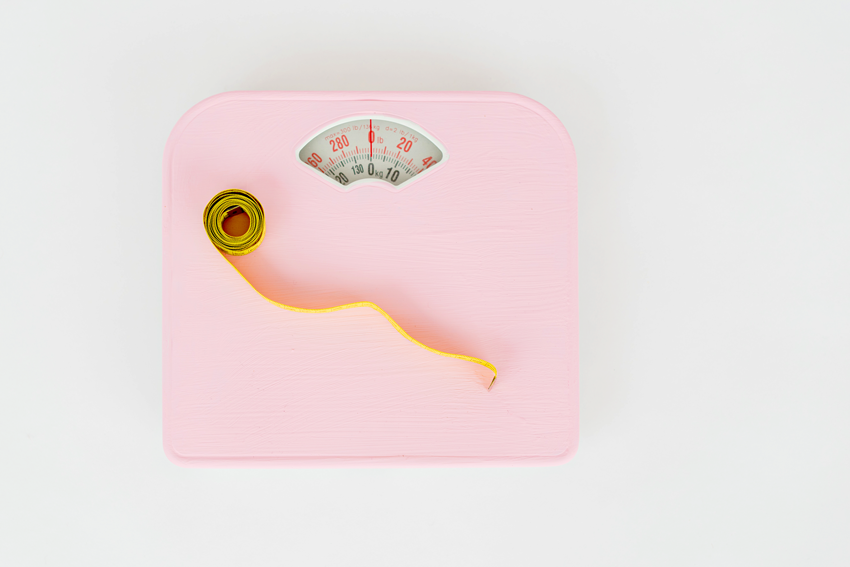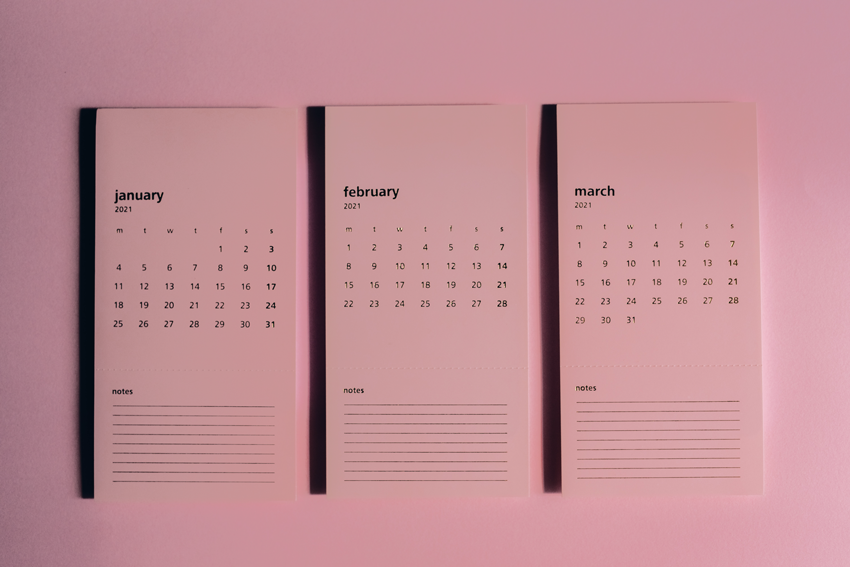When you begin your weight loss journey it’s natural to feel pumped up and ready to take on the world one pound at a time, but this can be fleeting.
Over time, you may find that you feel a little dejected and impatient, feeling like your hard work isn’t paying off as much as you would like.
At this stage it can be easy to lose sight of your end goal, maybe a few extra calories will slip back in and your exercise plan will slide out the window.
This is when you need to refocus on your goal, and figuring out how long your weight loss will take you realistically and when you could see results can help you to stay disciplined and stick to your weight loss plan, even if your motivation isn’t quite there.
So, how do you know how long it will take for you to notice your weight loss?
Our team has been investigating so we can shine some light on how long it will take before you and those around you begin to notice your hard work.
Let’s start at the very beginning (as Julie Andrews always says, it’s a very good place to start) and learn a little more about how weight loss works in the first place.
How does weight loss work?
To lose weight you’ll need to eat at a calorie deficit, which means that you’re consuming less energy than your body needs every day.
On the other hand, if you eat more calories than you need every day then you’re going to gain weight, so finding the right balance is essential.
As you continuously eat fewer calories, your body makes up for the deficit by burning the fat stored in your body to release energy — this is what causes weight loss.
Your body will need a bit more energy than you’re taking in every day, and as your fat reserves get burned, you’ll steadily shed the pounds.
As you lose weight, your body will need less energy to sustain itself, so the number of calories you’ll need to consume to hit a deficit will gradually lower.
Luckily, exercise can help with this, as it burns energy too, making it easier for you to stick to a calorie deficit every day.
Of course, this doesn’t mean you can eat whatever you want as long as you exercise, but it does mean that you’ll be able to consume a few more calories while remaining at a deficit.
This is why exercise and diet work hand in hand when you want to lose weight, it’s all about balance.

What happens when you start losing weight?
Firstly, when you start reducing your calorie intake, your body will start to use its glycogen stores for energy.
You’ll know about this usually in the first couple of weeks, as you might notice quite a significant loss on the scales at this time.
However, don’t see this as setting the bar for yourself.
A lot of the weight that you’ve lost so far will have come from the excess fluid that was in the body.
This doesn’t mean that you aren’t doing a great job, though!
It means that you’re doing an absolutely brilliant job of starting your weight management journey – it’s a sign that things are moving in the right direction.
Once the body has used up the stores of glycogen, it then starts to use stored fat as energy and this is ultimately what leads to weight loss.
When this happens, lipase (an enzyme that’s found in the blood vessels of your fatty tissue) stimulates the fat cells to release triglycerides.
This is what makes fat take up so much volume.
These triglycerides are then broken down and used elsewhere in the body for energy, and the parts that we don’t need are expelled as sweat, urine, and even carbon dioxide when we breathe out!
That’s right – when you lose weight, you technically sweat, pee and breathe out the excess fat.
However, all of this takes time.
If you’ve tried to lose weight before, you’ll know that it isn’t an overnight process, and requires a fair amount of patience and perseverance.
Weight loss works best when you’re prepared for making lifestyle changes such as weighing or measuring food, choosing healthier foods, and increasing the amount of physical activity that you do.
This is important even if you’re using weight loss supplements or medical treatments.
These core lifestyle changes will help you to maintain any weight loss in the future.
How long does it take for weight loss to show results?
So you know how to lose weight, you have a good idea of how long it will take, but when will people start to notice?
The amount of time it takes for weight loss to be noticeable to others depends on a few things, including your starting weight, your body type, and how often people see you.
A good rule of thumb is that people tend to notice your weight loss when you’ve lost around 10% of your starting weight, so if you started at 250lbs, people will start to notice when you’ve lost 25lbs.
Naturally, the same amount of weight loss can look different on different people.
For example, if someone who is 6’1” tall and weighs 300lbs loses 10lbs, it may be less noticeable than a 10lb loss on someone who is 5’1” and weighs 150lbs.
This is because 10lbs would be around 3.33% of the first person’s starting weight and 6.67% of the second person’s starting weight — person two has lost twice the percentage of person one!
Another factor to consider is your body type and where you tend to hold weight on your body.
If your body tends to lose fat in areas that seem less noticeable first, it may take longer for your weight loss to become obvious than the same loss on someone with a different body type.
You should also keep in mind that people who see you every day may take longer to notice your weight loss.
They’ll get used to the small but steady loss you’re making, which can make it more difficult to see, but if you don’t see someone for a while they’ll see all your progress at once and will be more likely to notice the difference.

There are many factors that might determine how long it might take for you to see a difference in your appearance, so let’s take a look at them in a little more detail:
Your starting weight
Your starting weight can have an impact on how long it takes for you to notice a difference.
Losing 5lbs on a larger body may be less noticeable than a smaller body losing 5lbs.
Whilst this may be disheartening, it simply means that your journey may take longer if your starting weight is higher – and that’s absolutely fine!
Weight loss isn’t a competition or a race.
It’s a gradual lifestyle change that enables you to live a healthier life.
How your age affects the time it takes to notice weight loss:
Skin elasticity is likely to be higher in your younger years.
This means that it’s more likely to spring back into its original shape after weight loss (dependant on other factors).
This can give the appearance of a slimmer frame much sooner than skin that’s less able to shrink back into its original shape.
This may also be the case for people that have a large amount of weight to lose, as some of the essential parts of the skin can get damaged as it stretches, reducing its elasticity.
How your Height affects how long it takes to notice weight loss:
Even your height can play a role in determining when you might begin to see weight loss results in the mirror!
Shorter bodies that are the same weight as taller bodies may appear to be larger, so weight loss may be less obvious on shorter bodies.
This also depends on other factors, including…
Your Genetics and their affect on weight loss results:
Sometimes, whether or not you notice weight loss quickly can be down to whatever genes you inherited from your parents.
Whilst it might seem unfair for those that struggle to lose weight, the best thing that you can do is to stop comparing yourself to others that don’t live inside your body.
You and your body are doing the best that you can.
Medications:
Some medicines may have an effect on weight, whether they act in a way that causes the body to hold on to weight (whether it’s from fat, muscle, or water), or even if they help with weight loss such as Semaglutide or Saxenda.
Sometimes, the medicine that you’re taking may affect how quickly you see results.
However, don’t just stop taking your medication – you should always consult your doctor before changing any of your medications.
Medical Conditions:
Some medical conditions can also affect weight loss and how quickly you might notice a change in your appearance.
For example, PCOS and hypothyroidism (alongside many other health conditions) can make it difficult to lose weight.
Other conditions may make weight loss easier.
In this case, you should be careful when taking any weight loss aids as it may cause rapid weight loss.
You don’t even have to be diagnosed with anything.
Individual levels of hormones in the body vary from person to person, so your individual make-up will also contribute to how quickly or slowly you notice a difference when you’re trying to lose weight.
We can’t control any of the factors above, so when we say it’s different for everyone, we really mean it!
Unfortunately, we can’t give a definitive answer as to how long it’ll take you to notice weight loss.
We can however give a few guidelines on what you might expect, and other ways that you may be able to notice weight loss.
When do you start noticing weight loss results?
Weight loss can be noticed in so many different ways by different people.
Some may notice a difference in the way their clothes feel before they see a result on the scale.
Others may notice that their weight is decreasing on the scales, but they might not notice a difference in their clothes.
Some people report a reduction in their waist size and others report that they’re able to bend down to do their laces again!

On top of a reduction in size and BMI, weight loss can also be noticed in other ways.
For example, finding that you aren’t as breathless when you climb the stairs, or that you have more energy.
You may even notice that you feel less pain day-to-day, especially if your weight has been affecting your joints.
It’s important to remember that weight loss isn’t all about weighing and measuring less.
It’s also about how you feel physically, and any improvements that you’ve noticed in yourself.
Weight loss should include healthy habits such as exercising more or choosing foods that will nourish your body.
Sustainable and healthy weight loss should be about making long-term lifestyle changes.
Some changes may take more time to adapt to than others, and that’s fine!
It’s important to take your time when you’re adjusting to new habits.
Making drastic changes can be difficult, as suddenly withdrawing something from your life can be more difficult to cope with long-term than gradually changing a habit.
In fact, you may be more likely to see successful and sustainable weight loss if you go at your own pace rather than trying to change everything in one go.
Remember – weight management is about progress, not perfection.
Even just being willing to make lifestyle changes is progress!
How your weight loss plan will affect the time it takes to see weight loss results?
If you’re trying to work out how long it will take you to lose weight through a calorie deficit, you could start by looking at how many calories correspond to a pound of weight.
As a rule of thumb, eating 500 calories less than you need every day for a week will lead to a loss of one pound.
This is a total of 3,500 calories fewer than you would normally consume in a week, and although we recommend keeping to a deficit of 500 a day, there is room for some higher calorie days as long as you balance them out with lower-calorie days.
For example, you may eat at a deficit of 400 calories one day and make up for it by eating at a 600 calorie deficit another day, although we would never recommend eating fewer than 1,000 calories every day unless you have been told to do this by a medical professional.
With that in mind, if you consistently eat at a deficit of 500 calories a day you can expect to lose a pound a week, which is a good number to aim for. Losing at this rate is realistic and achievable, and would see you losing a stone in about 14 weeks.
If you know how much weight you would need to lose to fall within the healthy BMI range, you can lose this estimate of a pound a week to work out how long it would take you to reach your goal weight.

How should I measure my weight loss?
You may see results with one measuring method sooner than with another.
Like we mentioned earlier – some people feel a difference in their clothes before seeing any movement on the scales.
Because of this, it’s often a good idea to use more than one measuring method to monitor your progress.
You can do this by taking measurements of some key areas of your body with a tape measure.
Some people even take progress photos weekly or monthly.
It can be easy to get disheartened when we don’t see the change for ourselves, so monitoring your journey in more than one way may help you to see how well you’re doing!
Your myBMI dashboard should give you an overview of your monthly progress as a chart so that you can see how you’re doing.
Don’t worry if your weight loss slows down or stalls.
Plateaus are completely normal and healthy, and you may still be losing inches if there’s no movement on the scales.
Stay focused and relaxed.
You may just need to make some minor tweaks to kick start your weight loss again.
You can’t do any more than your best, and beating yourself up won’t burn any calories (however, beating a punching bag probably will if you need to vent your frustrations!).
Generally, we’d advise you to not expect any significant change in your appearance for the first 4-6 weeks as this may put you under unnecessary and unrealistic pressure.
Some people do start to see the results of their weight loss within a month or so, but as we’ve already seen, there are so many factors that can contribute to your own personal timeline, so please don’t worry if you’re going at a different pace to others.
If you’ve been on your current weight loss plan for around 12 weeks and haven’t noticed any results, you should visit your GP, as you may need some tests to see if anything’s preventing you from losing weight.

















